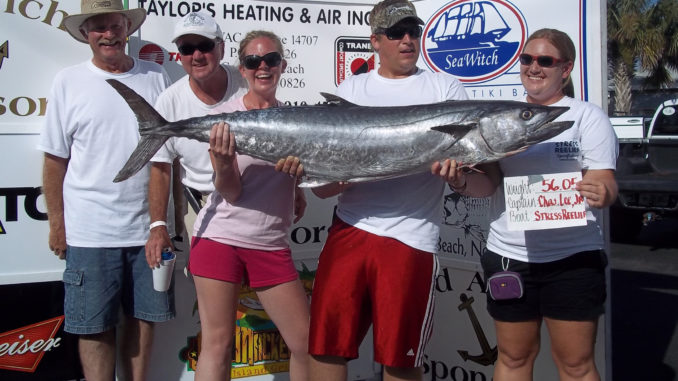
Is sagging participation a warning too late?
Could there be too many fishing tournaments along North Carolina’s coast?
Did the question catch you off guard? I don’t know that anyone has ever put together a list of all the tournaments that are held, and I believe it is a legitimate question, especially when considering the state of the economy.
Over the past several years, even tournaments with long histories of success have experienced a general decline in participation. At the same time, there has been a surge of smaller tournaments popping up. I’m not particularly wise, but I am smart enough to realize that declining participation and increasing the number of tournaments has to reduce the number of fishermen per tournament.
Competing tournaments are even being held in the same areas on the same weekends, forcing fishermen to choose, with neither tournament reaching its potential. It’s bad enough to have tournaments targeting different species in the same area at the same time, but it is really poor planning to hold tournaments for the same species at the same time.
So, could there really be too many tournaments? Participation is already lagging in many tournaments, so how could having more of them benefit anyone.
I need to be completely honest and admit that at one time, I was a tournament junkie. From the late 1980s to the early 2000s, I fished most years more than 20 tournaments. One year, I fished in 28 tournaments, and several years the number exceeded 25. The most remarkable stretch was one summer when several tournaments got bunched up in the schedule, and we fished three in eight days. The rest of the year was easy after that.
What is the issue? I blame the general decline of participation on the lagging economy. If you haven’t noticed, the economy isn’t what it was just 10 years ago. Fishermen cannot afford to fish the number of tournaments they did in the past. In addition to financial considerations, it is also more difficult to get time off to attend tournaments. The job market is tough, and no one wants to jeopardize a good job by taking too much time off.
I blame the internet on the proliferation of fishing tournaments. People have read about tournaments, seen some of the big cash prizes and see them as an easy way to raise money. When a civic or charitable group needs to raise funds, a fishing tournament is often considered. The general feeling is they are easy to organize, and by simply posting one on places like Facebook, the word will spread and draw a crowd.
Unfortunately, it isn’t as easy as it seems. It takes more than finding a location and announcing a date to have a successful tournament. A few tournaments organized by groups or fishermen with large followings have been reasonably successful in this manner, but many only attract a few boats and barely break even or maybe lose money. The problem is compounded, as these events also hurt other tournaments because they attract fishermen that would have gone elsewhere. This is bad for tournaments and the fishermen.
My personal experience is primarily with king mackerel tournaments, and there was a time when tournaments drawing less than 100 boats were considered weak. Now, there are only a handful that attract this number, and some of the tournaments attracting less than 100 competitors are considered major tournaments.
One tournament director was genuinely excited when he told me his tournament grew to 30-some boats in 2012 from 20-some in 2011. Sure, that is significant growth, percentage-wise, but is it an amount able to support the expense of the tournament and raise funds for the beneficiary?
Most tournaments benefit some charitable or civic cause, and I can’t see how a king mackerel tournament could be a successful fundraiser attracting only 30 boats. There are expenses that will eat up most of even a $300 entry fee. I don’t see these low numbers being attractive to sponsors or fishermen.
Many fishermen say they compete for the love of the sport. That may be true, but it is an undeniable fact that it takes money to fill gas tanks, buy bait, rigs or lures and enter tournaments. Fishermen need the tournaments to be large enough they can win enough to at least cover expenses if they place well. On the other side of the equation, sponsors need exposure to larger numbers of people to justify their participation. Tournaments are hard work, and even events staffed with volunteers need to generate reasonable funds for their charity to be worthwhile.
Many weekends last year, three, four or five tournaments were scheduled, and on several occasions, there were tournaments targeting the same species within 25 miles of each other. This may be okay when one of the tournaments features offshore fish, one features king mackerel and the third features inshore species, but when several tournaments target the same species, the pool of potential participants is divided and the events suffer, especially when they are geographically close together.
A couple of tournaments drew so few participants they were cancelled for lack of interest. Fundraisers can’t even break even like this; someone had to cover the expenses to that point.
The N.C. Division of Marine Fisheries tries to gather a list of tournaments each year that organizers can go to if they want to see when and where other tournaments are being held. While free, this is a volunteer listing, and many tournaments don’t make use of it.
My question is, wouldn’t everyone be better off with fewer but larger tournaments that had reasonable entry fees, good payouts for fishermen, attracted a hundred or more participants and some spectators for the sponsors and raised significant funds for the charity?
I don’t claim to have the answer to make this happen, but I think it is something that needs to be considered. I challenge all the creative minds to forge a solution. I’m sure it can be done.

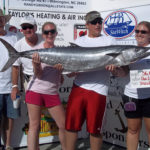
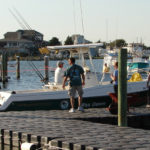
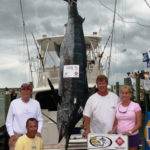


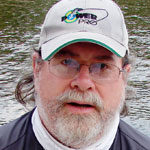
Be the first to comment